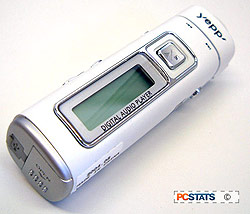Along with the YP-55i MP3
player comes a driver CD, stereo headphones, USB cable, carry case,
direct-connect USB adaptor, mini-headphone line cable, instructions, neck strap,
warranty card and an AAA battery (yay!). Most of this included gear is
self explanatory, but a few accessories are worth focusing on.
The 'direct
connect USB adaptor' looks like a USB plug with a tiny metal connector on the other
end. The adaptor plugs into the base of the YP-55i, quickly allowing users to connect
it to a PC or notebook without having to carry around the more cumbersome
full-length USB cable.
As the Yepp
YP-55i doubles up as a USB hard drive too (it has 192MB of
storage after all), Samsung have thankfully improved on past Yepp models, and software is
no longer required to communicate through the USB1.1 connection.
 |
 |
| Recording a song off the radio directly to MP3 format
is quick and simple to do with the YP-55i. Sound quality is pretty good, with encoding options of 32-128kbps. Up to 20 radio station presets can be programmed, incidently. |
On a WindowsXP test system, the YP-55i quickly configured itself and showed
up in Windows Explorer as any USB removeable disk might. Transferring MP3
files, or any files really, to the YP-55i is as straightforward as
copying them from one drive to another. Additionally, any FM Radio recordings you
may have encoded on the fly (encoded at 128kbps, 44kHz for those wondering), can
be played right back from the YP-55i through the desktop PC. 
While the YP-55i is
connected via the USB port, it is powered entirely by the USB connection -
a nice change from past designs which tended to always rely upon the
internal batteries.
The one caveat to this is that you cannot run the
YP-55i off the power from the USB connection and listen to anything through it -
say for example if you run out of batteries, and your PC doesn't have a sound
card. When it is hooked up to the PC, the YP-55i functions solely for
transferring data.
Equipped with
a standard 12Mbps USB1.1 connection, the YP-55i will take about 5 minutes to fill
up its onboard memory with a roster of freshly uploaded tracks. Of
those tracks, it will gladly play any 48kbps - 192kbps encoded WMA files, or
MP3 tracks encoded at 8kbps - 320kbps, including VBR, with equal tenacity.
Samsung suggest that WMA files encoded under 48kbps won't play, though I don't think may people
would want to listen to songs recorded so roughly.
